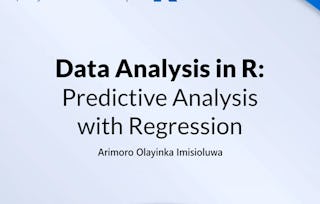Updated in May 2025.
This course now features Coursera Coach! A smarter way to learn with interactive, real-time conversations that help you test your knowledge, challenge assumptions, and deepen your understanding as you progress through the course. This course delves into regression analysis using R, covering key concepts, software tools, and differences between statistical analysis and machine learning. - You'll learn data reading, cleaning, exploratory data analysis, and ordinary least squares (OLS) regression modeling, including theory, implementation, and result interpretation. - You'll tackle multicollinearity with techniques like principal component regression and LASSO regression, and cover variable and model selection for performance evaluation. - You'll handle OLS violations through data transformations and robust regression, and explore generalized linear models (GLMs) for logistic regression and count data analysis. - Advanced sections include non-linear and non-parametric techniques such as polynomial regression, GAMs, regression trees, and random forests. Ideal for statisticians, data analysts, and machine learning practitioners with basic R knowledge, this course blends theory with hands-on practice to enhance your regression analysis skills.















